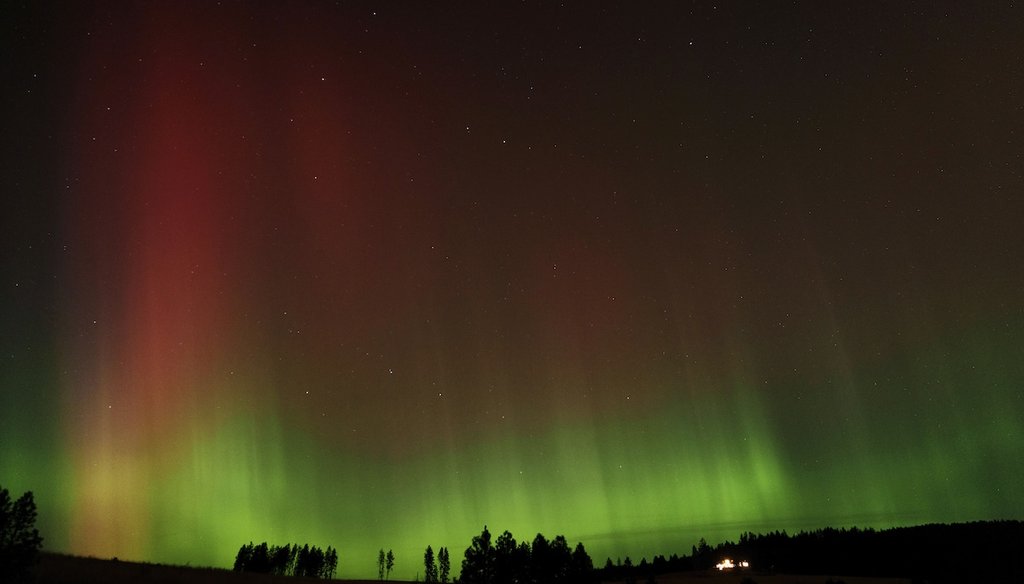



An aurora borealis, also known as the northern lights, is seen in the night sky along with the Big Dipper constellation on Oct. 10, 2024, in Moscow, Idaho. (AP)
The northern lights or aurora borealis are produced because of interactions between electrons and atoms and molecules of gases such as oxygen and nitrogen. Experts say sprayed chemicals could not produce long-lasting and widespread lights such as aurora.
Scientists have rejected the "chemtrails" conspiracy.
If you stood outside in October hoping to watch a natural light show in the sky, you’re not alone. The northern lights were visible in multiple U.S. states.
But one social media user claimed that the phenomenon is anything but natural.
"Spray the sky all day long and no one takes any notice and say ‘its normal,’" an Oct. 11 Threads post read. "Nighttime arrives and the sky is glowing with chemicals and (everyone) is On facebook screaming about seeing the northern lights."
This post was flagged as part of Meta’s efforts to combat false news and misinformation on its News Feed. (Read more about our partnership with Meta, which owns Facebook and Instagram.)
No need to edit your Facebook photo caption from calling the phenomenon "northern lights." Experts say manufactured chemicals could not produce lights that are as widespread and that move the way northern lights do.
The northern lights or aurora borealis are produced when electrons collide with atoms and molecules of gases like oxygen and nitrogen in the Earth’s upper atmosphere. Katrina Bossert, a space physicist who is an assistant professor at Arizona State University’s School of Earth and Space Exploration, said visible aurora — red and green — are produced because of oxygen atoms’ activity. Nitrogen molecules can produce other colors.
"There is no chemical outside of oxygen that I am aware of that could produce the long lasting auroral displays we have been seeing over the US in the distinct green and red colors," Bossert said.
Robert Steenburgh, a space scientist at the NOAA Space Weather Prediction Center, told PolitiFact the ingredients of aurora — electrons, atoms and molecules — are "already present naturally."
Claims of chemical spraying in the sky often fall under the "chemtrails" conspiracy, which atmospheric chemists and geochemists have rejected. A 2016 study surveyed 77 scientists and all but one of them said they have not found evidence of a "secret, large-scale atmospheric spraying program."
Line-shaped clouds in the sky are not proof that bad actors are spraying chemicals over land; these clouds are condensation trails or contrails, which are produced by aircraft engine exhaust and primarily consists of ice crystals.
Because of a severe geomagnetic storm, many people in North America saw the Oct. 11 aurora borealis. Storms such as this make it likelier for aurora borealis to occur.
It is not unusual for the aurora borealis to be observed in the U.S. Steenburgh said the region of the aurora or the "auroral oval" expands and moves toward the equator during geomagnetic storms.
Aaron Ridley, a professor at University of Michigan’s Climate and Space Sciences and Engineering Department, said hundreds of people capture and upload photos of aurora across many countries. "There are no chemicals that could be deposited across this much space and lit up in this way," he said.
He also said that no sprayed chemical could act in the atmosphere like northern lights do; they brighten and dim. Ridley said such chemicals would move with the wind.
Some scientific rocket experiments release chemicals that can emit light, such as trimethyl aluminum, barium and strontium, said Toshi Nishimura, Boston University research associate professor who studies aurora. "Though strictly speaking, they are not aurora but airglow," he said.
A rare NASA experiment uses sounding rockets that emit tracers to measure winds in the upper atmosphere and ionosphere.
The trimethyl aluminum produces a whitish glow when it reacts with oxygen atoms, Bossert said, but this dissipates quickly. "The trail has a distinct look and would not be mistaken for widespread aurora," Bossert said.
We rate the claim that the northern lights are chemicals sprayed in the sky False.
RELATED: Geomagnetic storm, not a HAARP experiment, created dazzling, worldwide northern lights display
Threads post (archived), Oct. 11, 2024
Email exchange, Katrina Bossert, Arizona State University School of Earth and Space Exploration assistant professor, Oct. 17, 2024
Email exchange, Aaron Ridley, professor at University of Michigan’s Climate and Space Sciences and Engineering Department, Oct. 17, 2024
Email exchange, Robert Steenburgh, space scientist at the NOAA Space Weather Prediction Center, Oct. 18, 2024
Email exchange, Toshi Nishimura, Boston University research associate professor, Oct. 18, 2024
Email exchange, Joshua Semeter, Boston University professor of electrical and computer engineering and director of the Center for Space Physics, Oct. 18, 2024
NOAA Space Weather Prediction Center, Aurora, accessed Oct. 17, 2024
NOAA Space Weather Prediction Center, Aurora Tutorial, accessed Oct. 18, 2024
PolitiFact, Geomagnetic storm, not a HAARP experiment, created dazzling, worldwide northern lights display, May 13, 2024
PolitiFact, ‘Chemtrails’ are not causing diseases. They’re not real., April 27, 2023
Environmental Research Letters, Quantifying expert consensus against the existence of a secret, large-scale atmospheric spraying program, Aug. 10, 2016
Environmental Protection Agency, Aircraft contrails factsheet, accessed Oct. 18, 2024
NASA, NASA and Vapor Tracers, accessed Oct. 18, 2024
NOAA, Severe Geomagnetic Storm Causes Visible Aurora in North America, Oct. 16, 2024
Space Weather Archive, Blue Squids over Norway — Crazy Artificial Auroras, April 8, 2019
USA Today, Northern lights forecast: Aurora borealis may appear in multiple US states, NOAA says, Sept. 25, 2024
In a world of wild talk and fake news, help us stand up for the facts.
